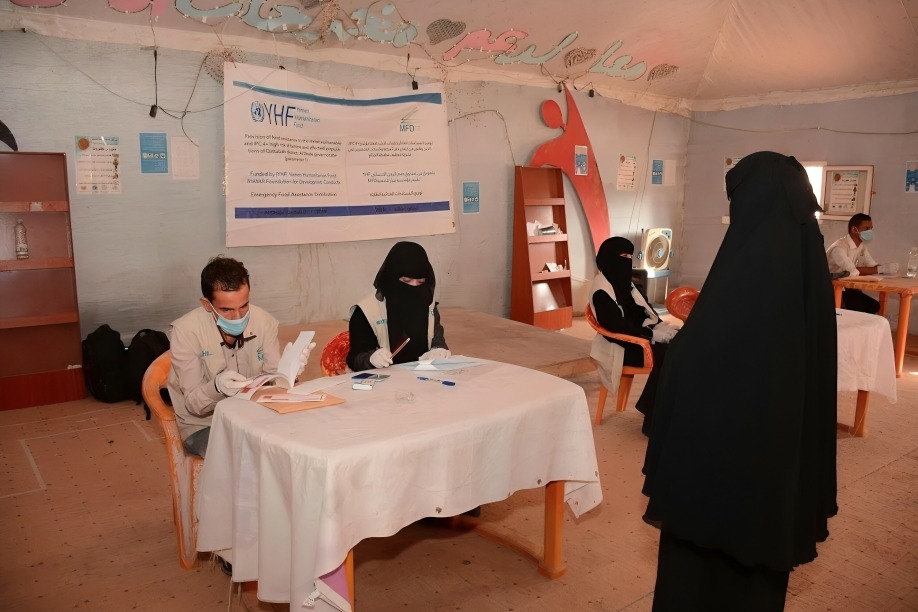


Barran Press
International aid organizations operating in Yemen reported on Tuesday, August 6, 2024, that a combination of escalating risks, tightening restrictions imposed by the Houthi group (internationally designated as a terrorist organization and backed by Iran), and a decade of humanitarian efforts have heightened concerns for the safety of aid workers.
This assessment, conducted for the aid organizations, highlighted the dangers of detention, movement restrictions, and complex humanitarian operations. It pointed to "restrictions imposed on the activities of various humanitarian organizations," according to the London-based newspaper "Asharq Al-Awsat."
The analysis stated that "the suspension of services has affected community morale, increased protection risks, and exacerbated vulnerabilities among beneficiaries. Furthermore, the complete cessation of activities in some areas has sparked community resentment and resistance."
The analysis noted that the Houthi-controlled Supreme Council for the Management and Coordination of Humanitarian Affairs, described as a "intelligence agency formed by the Houthis," has implemented stricter measures on the work of humanitarian organizations and their personnel, "complicating humanitarian efforts."
These measures include "requiring prior approval from the council for all activities, coordinating exclusively through its offices, and using only its approved data and collection tools."
The Houthi council has criticized the work of some relief agencies for failing to comply with its directives and accused them of mismanaging funds, leading to the suspension and delay of their operations.
According to the analysis, staff are being warned to strictly adhere to recent directives issued by the council, which require prior approvals for data collection models, training, capacity building, and activities. The analysis notes that failure to comply with these instructions could jeopardize the safety of staff.
The analysis stated that "worryingly, one partner organization reported that its staff are at risk of arrest in Houthi-controlled areas. This organization is working to secure alternative funding to continue its programs and is engaging in discussions with local authorities to address the issue of staff detention. It is also working to strengthen its security protocols to protect its staff and ensure the continuity of vital protection services."
The analysis addressed recent security events and the ongoing banking crisis between the government and the Houthis, along with the persistent funding shortage. It stated that these factors have exacerbated the protection crisis in the country. The analysis warned that without immediate intervention, gaps in protection services could lead to increased violence, further displacement, and loss of livelihoods.
The UN analysis revealed that security operations and bureaucratic hurdles "delay the deployment of personnel and resources, reducing the speed of operations and response in crisis-affected areas."
The analysis noted that Houthi authorities in Sana'a recently refused to send missions to specific areas under their control in Marib Governorate, particularly those suffering from a lack of services, and in Hodeidah. It added that staff movements have been significantly reduced to mitigate risks.
The analysis observed that Houthi authorities are delaying approval requests for movement and rejecting some altogether, further hindering the ability of humanitarian actors to work effectively and reach those in need.
The analysis emphasized that the group continues to impose restrictions preventing women from traveling unless accompanied by a male relative (mahram). It stated that delays in service delivery and the complete suspension of activities in some areas have led to increased community tensions.
The analysis reported that anti-organization media campaigns have also contributed to negative perceptions of humanitarian actors, impacting their work and complicating efforts to rebuild trust and resume operations. It warned that the consequences of inaction are severe and far-reaching.
The analysis stressed that excessive government interference in protection programs, government monitoring and restrictions on protection activities, pose significant obstacles for protection partners. Programs such as the management of gender-based violence and child protection, psychosocial support, and legal assistance struggle to meet the standards set by authorities in these areas.
The analysis called on the National Protection Cluster to participate in strong advocacy efforts to influence policy changes and organizational reforms. It urged the cluster to highlight the challenges and the impact of the stringent requirements imposed by the Houthi Humanitarian Affairs Council on relief operations, demanding that it reconsider its positions and adopt more streamlined and transparent procedures to facilitate operations and reduce partner concerns.